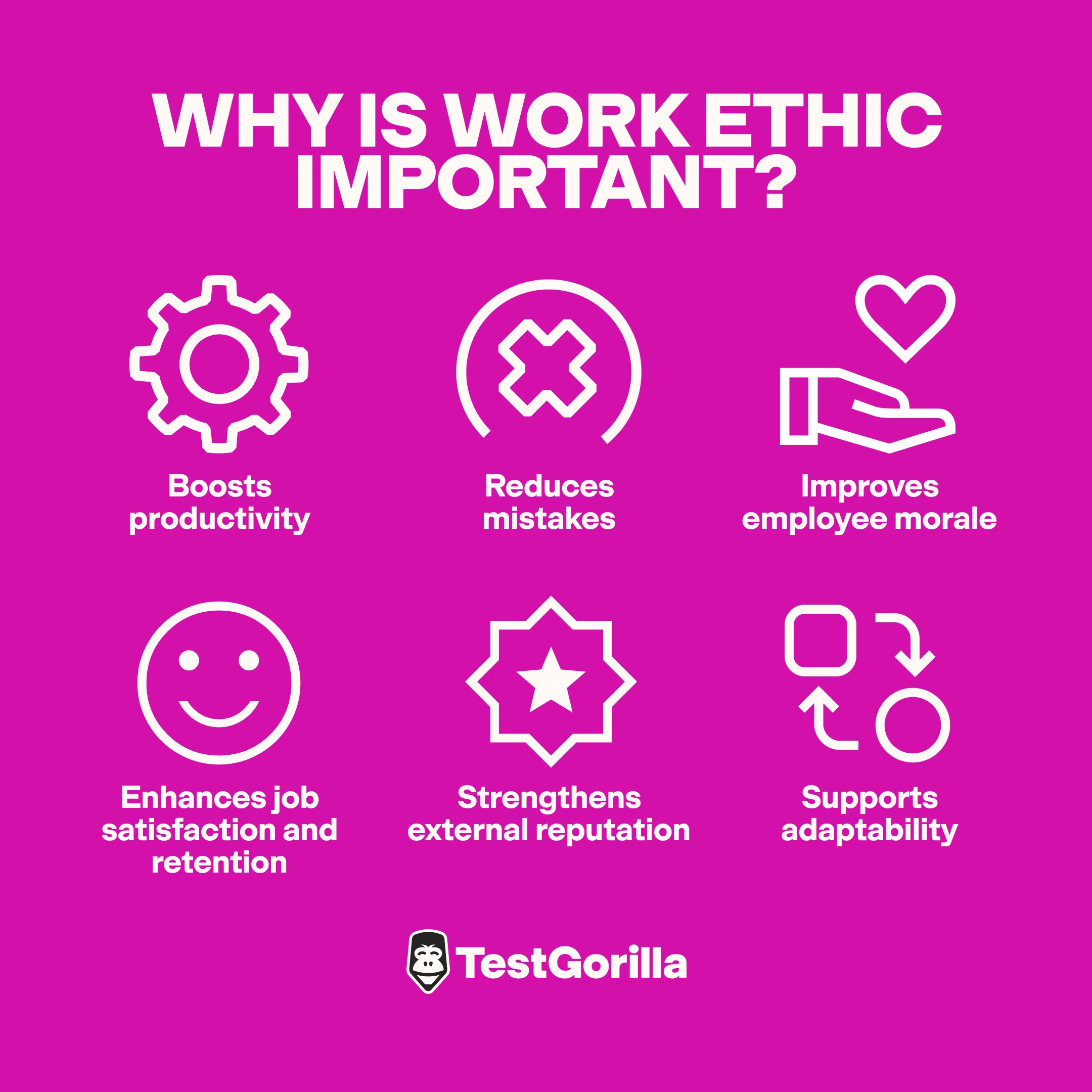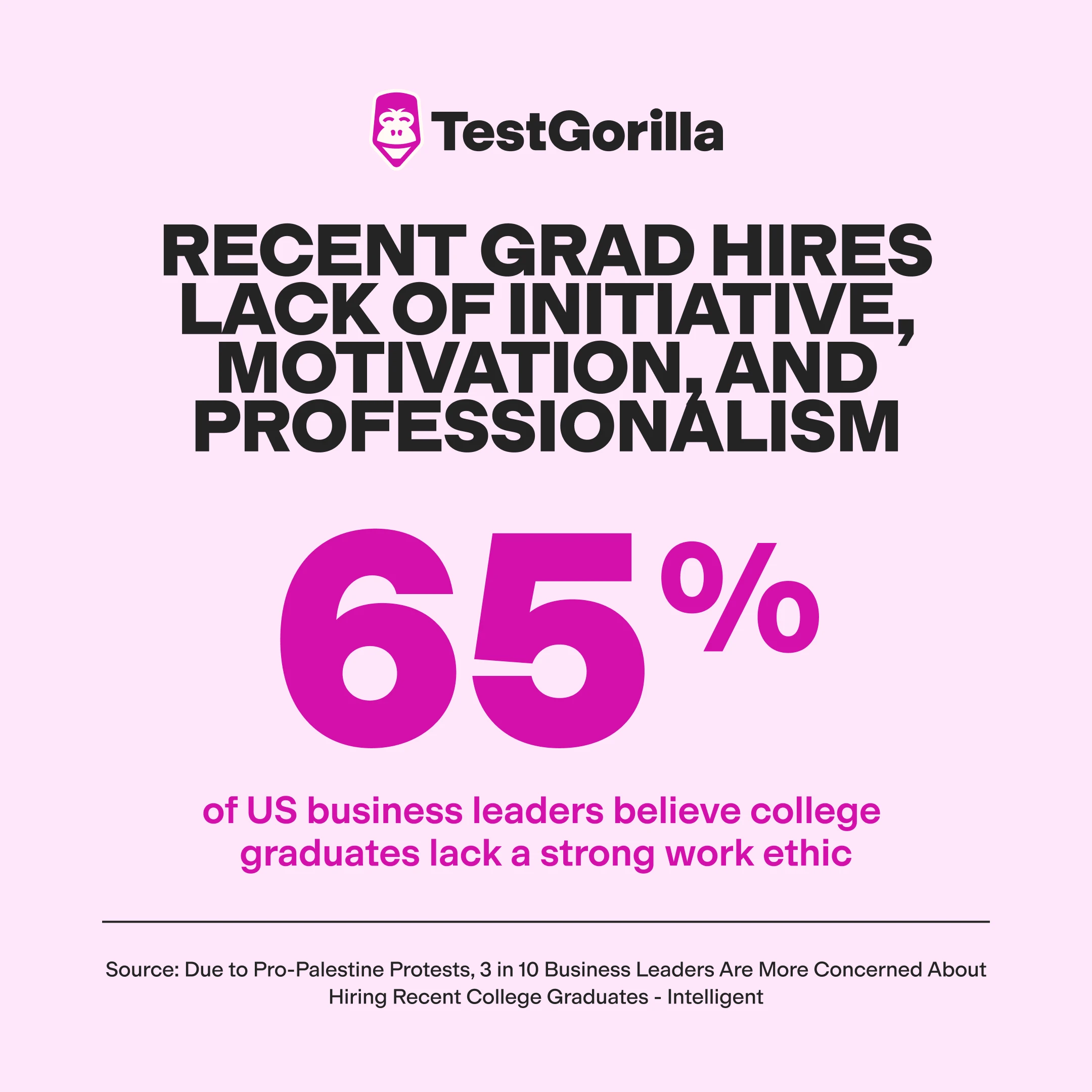Sometimes, even companies with the latest tech, best processes, skilled talent, and market demand don’t work out.
While this leaves many scratching their heads, it often boils down to poor work ethics. When team members aren’t as committed and dedicated to their jobs as they should be, things can quickly go south.
Want to avoid this mess? We’re here to help.
In this guide, we break down what work ethic is and look at some eye-opening stats on why it’s non-negotiable. We also explore what leads to good versus bad work ethics and share top tips on fostering stronger work ethics and a productive work environment in your company.
What is work ethic?
Work ethic is a soft skill or set of values covering employees’ discipline, effort, and commitment to doing their job well.
Strong work ethics are characterized by qualities, beliefs, and behaviors such as:
Showing up to work on time
Producing high-quality work consistently
Having good attention to detail
Being proactive in completing tasks
Maintaining a positive attitude even in the face of challenges
Taking the initiative in one's professional growth
Going the extra mile without being asked
Taking accountability for one's mistakes
Upholding company values like honesty, integrity, and customer focus in every aspect of work
Why is work ethic important?
Here’s why work ethics matter.
1. Boosts productivity
When employees are committed to their jobs and invested in continuous learning and upskilling, work gets done faster and better. These team members are proactive, highly engaged, and go above and beyond in their tasks. Projects run like clockwork, leaders can focus on the bigger picture and strategy, and your company will see an overall increase in output and high-quality results.
In fact, one study showed that work environment, work discipline, and work ethic have a significant and positive influence on employees’ productivity. What’s more – research also shows this effect at a macro level, where work ethic has a significant effect on countries’ GDP per capita.
2. Reduces mistakes
Attention to detail is a big part of a solid work ethic. Team members who double-check their work and pay attention to the little things tend to make fewer errors or spot and address them before they escalate into larger, costlier issues.
3. Improves employee morale
When employees are diligent, reliable, and proud of their work, it creates a positive work environment that’s hard to ignore. For example, when your employees know their colleagues respect each others’ time and space, are punctual, and can get the work done, there are better team dynamics, less friction, and more team synchronization.
4. Enhances job satisfaction and retention
Employees with a strong work ethic tend to feel a deeper sense of achievement and fulfillment in their work and are, therefore, more likely to stick around. The results of one survey revealed that good work ethics are positively associated with employee satisfaction, which in turn leads to increased commitment to the company, lower turnover, and improved productivity.
5. Strengthens external reputation
A company full of hardworking and dedicated staff members is bound to get noticed in multiple ways. You’ll attract more business, better partnerships, and the best talent because people want to work with and for you.
Additionally, employees with a good work ethic go the extra mile to meet customer needs and follow through on requests and queries, leading to happy and loyal customers.
6. Supports adaptability
Employees with great work ethics are typically more willing to learn new skills or switch gears when needed. This is crucial, especially in today’s fast-changing landscape, and can make all the difference in giving you a competitive advantage.
For this reason, the World Economic Forum’s latest Future of Jobs report lists self-efficacy skills like resilience, flexibility, and agility, plus motivation and lifelong learning, as some of the most sought-after traits in the next few years.
The best insights on HR and recruitment, delivered to your inbox.
Biweekly updates. No spam. Unsubscribe any time.
What impacts work ethic? 10 statistics
So, what impacts work ethics? Some schools of thought claim it’s innate – meaning people are born with it. At TestGorilla, we believe positive work ethics are behavioral and shaped by a mix of good upbringing, solid personal values, and a supportive work environment.
Let’s take a look at 10 eye-opening statistics to get a better understanding of how work ethics play out across different locations, generations, ages, backgrounds, and other demographic factors.
1. At 62.6%, the Labor Force Participation Rate (LFPR) is at a 25-year low.
The LFPR is the proportion of able-bodied Americans who are either employed or actively looking for work. This percentage has dropped from about 67% in the early 2000s to 62.6% in 2023. That means 37% of Americans who are neither retired nor students or caregivers have voluntarily dropped out of the workforce.
While this isn’t a work ethic statistic per se, it highlights an overall shift in attitudes towards work in the US.
2. In one study, US participants were found to be more committed to work ethic than Canadian participants.
The study of 210 individuals found that this higher work ethic was driven by work-related individualism, which is the idea that people are personally responsible for their success and that success is measured individually rather than as a group.
3. The average American worker puts in 1,799 hours of work per year, which is 188 hours more than Japan and 275 hours more than the UK.
The study by WalletHub attributed this to a strong work ethic that is deeply embedded in American culture and stands at the center of the American dream.
4. Four out of 10 of the US’ most hard-working cities are in Texas – Irving, Dallas, Austin, and Arlington.
The above-mentioned study by WalletHub also examined 116 of the most populous cities in the US on factors like average workweek hours, employment rate, vacation time used, number of jobs, annual volunteer hours, etc.
Here’s a list of the top 10 “hardest-working” cities:
Anchorage, AK
Washington, D.C.
Irving, TX
Dallas, TX
Cheyenne, WY
Austin, TX
Denver, CO
Virginia Beach, VA
San Francisco, CA
Arlington, TX
5. The percentage of 18-year-olds willing to work overtime fell from 54% before COVID-19 to 36% after the pandemic – a drop of 33% in two years and an all-time low in over 45 years.
These results from the nationally representative Monitoring the Future survey also found that the number of 18-year-olds who said they would not want to work if they had enough money increased from 22% pre-pandemic to 29% post-pandemic.
Additionally, they were less likely to say work would be a central part of their life or expect that their future jobs would be satisfying.
6. Compared to younger workers, older workers above the age of 45 are more likely to rate job enjoyment as their biggest motivation at work, while younger generations consistently choose pay above all other motivators.
These results from a study examining how work ethic has changed over the years indicate that younger people are not as intrinsically motivated as previous generations.
An article in Fortune attributed this to being “raised on a diet of four hours of social media a day,” living through an isolating pandemic, having remote and hybrid work as part of their normal, prioritizing work-life balance, and getting less time with mentors than previous generations.
7. Women have been found to have a better work ethic and performance than men.
This research was conducted in Iceland, one of the most gender-neutral countries in the world. Our take on these findings? This could stem from workplace inequalities and unconscious biases, which drive women to go above and beyond to prove their capabilities and get pay hikes and promotions at work.
8. 52% of strong conservatives and 33% of White Americans attribute poor life outcomes, such as low income, to a lack of work ethic.
On the flip side, findings show that strong liberals point to systematic issues and lack of opportunities, not work ethic, as the cause for poverty, and only 13% of Black Americans think lack of work ethic is the issue.
9. 65% of US business leaders believe college graduates lack a strong work ethic.
This research by Intelligent, an education and technology platform, surveyed over 1,200 US leaders and found that 75% of companies reported their college grad hires were unsatisfactory, citing reasons such as a lack of initiative, motivation, and professionalism. 50% also said today’s college graduates are entitled.
10. Contrary to popular belief, most employers don’t believe college graduates have a better work ethic than non-degree workers.
Research by the Harvard Business School found that employers believed graduates and non-graduate workers were the same in terms of productivity, drive for career advancement opportunities, need for supervision at work, and absenteeism rates, all of which are part of overall work ethics.
4 ways to improve work ethic in your company
Here’s how you can improve work ethics in your organization.
1. Rethink how you define work ethic
The above statistics have made one thing clear – this generation of workers values work-life balance, flexibility, and personal growth.
As such, you must stop defining a good work ethic with factors like unused vacation leave or multiple jobs. Instead, focus on quality of work and business results. This way, you can stay realistic about what good and bad work ethic means in a post-pandemic world and invest in the right areas of improvement.
2. Hire people with a strong work ethic
Getting the right people on board from the start is possibly the most sure-fire way to improve the work ethic in your company. To do this, you must check for work ethic-related traits and skills.
Additionally, ensure your chosen candidate not only matches but can also contribute to your company’s ethos and help create a positive work culture. Deloitte found that employees are likely to be engaged in companies that align with their values.
How can you assess work ethic accurately?
With platforms like TestGorilla.
Our library of 400+ tests can measure candidates’ hard and soft skills, personality traits, cognitive abilities, cultural preferences, and more.
You can use these to assess accountability, time management, conscientiousness, motivation, attention to detail, and values, revealing candidates with good work ethics right off the bat.
Also, to gain further insights, consider using behavioral interview questions that ask candidates to describe times they've overcome challenges, stayed true to their values, and improved processes.
3. Lead by example
Employees tend to mirror the behavior of their managers and leaders. Ensure you’re coaching your managers and leaders to consistently demonstrate qualities like hard work, dedication, punctuality, and professionalism – setting a high standard for everyone else.
4. Link work ethic to performance and recognition
Tie work ethics into a successful career for employees. For example, linking work ethics to performance reviews, promotion criteria, and rewards and recognition programs can motivate employees to maintain high standards.
For example, when someone showcases a great work ethic, give them a public shout-out, being very specific about what behaviors you’re praising and how these helped the company. This way, you make them feel valued and encourage other team members to emulate the same behaviors.
Conversely, when employees exhibit poor work ethics, make sure to provide specific feedback about where they can improve.
Use skills-based hiring to hire candidates with a strong work ethic
Characterized by qualities like high engagement, punctuality, proactiveness, and professionalism, work ethic is one of the most underrated soft skills. It affects productivity, employee morale, and your company's reputation and can be the difference between your organization succeeding or failing.
While some believe people are born with good work ethics, statistics show it can be determined by factors like location, culture, changing work priorities, education, and other external influences.
Regardless, taking active steps, such as measuring candidates' work ethics through talent assessments and interviews, linking work ethics to performance, and training your leaders, can improve work ethics in your company in no time.
Keen to explore our talent assessments? Create a free account with TestGorilla today.
You've scrolled this far
Why not try TestGorilla for free, and see what happens when you put skills first.
















